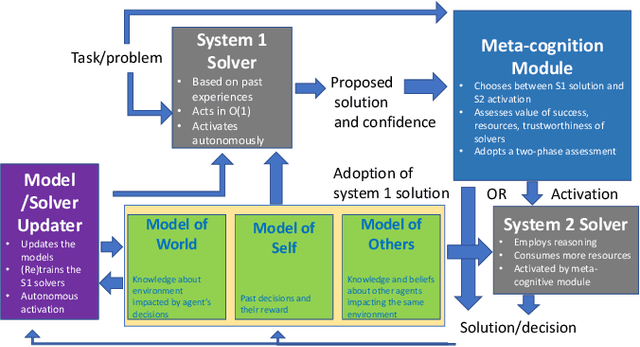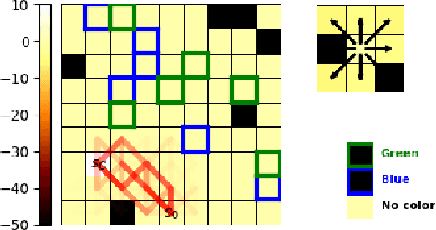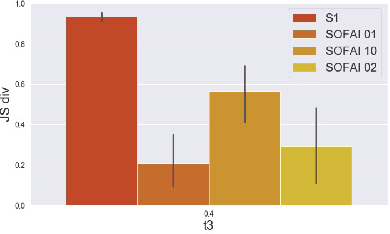Jon Lenchner
Combining Fast and Slow Thinking for Human-like and Efficient Navigation in Constrained Environments
Jan 18, 2022



Abstract:Current AI systems lack several important human capabilities, such as adaptability, generalizability, self-control, consistency, common sense, and causal reasoning. We believe that existing cognitive theories of human decision making, such as the thinking fast and slow theory, can provide insights on how to advance AI systems towards some of these capabilities. In this paper, we propose a general architecture that is based on fast/slow solvers and a metacognitive component. We then present experimental results on the behavior of an instance of this architecture, for AI systems that make decisions about navigating in a constrained environment. We show how combining the fast and slow decision modalities allows the system to evolve over time and gradually pass from slow to fast thinking with enough experience, and that this greatly helps in decision quality, resource consumption, and efficiency.
Thinking Fast and Slow in AI: the Role of Metacognition
Oct 05, 2021
Abstract:AI systems have seen dramatic advancement in recent years, bringing many applications that pervade our everyday life. However, we are still mostly seeing instances of narrow AI: many of these recent developments are typically focused on a very limited set of competencies and goals, e.g., image interpretation, natural language processing, classification, prediction, and many others. Moreover, while these successes can be accredited to improved algorithms and techniques, they are also tightly linked to the availability of huge datasets and computational power. State-of-the-art AI still lacks many capabilities that would naturally be included in a notion of (human) intelligence. We argue that a better study of the mechanisms that allow humans to have these capabilities can help us understand how to imbue AI systems with these competencies. We focus especially on D. Kahneman's theory of thinking fast and slow, and we propose a multi-agent AI architecture where incoming problems are solved by either system 1 (or "fast") agents, that react by exploiting only past experience, or by system 2 (or "slow") agents, that are deliberately activated when there is the need to reason and search for optimal solutions beyond what is expected from the system 1 agent. Both kinds of agents are supported by a model of the world, containing domain knowledge about the environment, and a model of "self", containing information about past actions of the system and solvers' skills.
Thinking Fast and Slow in AI
Oct 12, 2020Abstract:This paper proposes a research direction to advance AI which draws inspiration from cognitive theories of human decision making. The premise is that if we gain insights about the causes of some human capabilities that are still lacking in AI (for instance, adaptability, generalizability, common sense, and causal reasoning), we may obtain similar capabilities in an AI system by embedding these causal components. We hope that the high-level description of our vision included in this paper, as well as the several research questions that we propose to consider, can stimulate the AI research community to define, try and evaluate new methodologies, frameworks, and evaluation metrics, in the spirit of achieving a better understanding of both human and machine intelligence.
 Add to Chrome
Add to Chrome Add to Firefox
Add to Firefox Add to Edge
Add to Edge